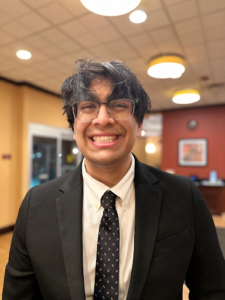Participation in the Georgetown Global Dialogues
Georgetown Humanities Student Fellow Aayush Murarka (SFS ’26) share their thoughts on their participation in the Georgetown Global Dialogues.

After two years at Georgetown, I have realized that there are two seemingly similar, but inherently contradictory, dynamics at the intersection of prestige, academia, and dialogue: proximity and intimacy.
Proximity demands a focal point around which others can gather. It is the carefully ordered line of students tumbling into Gaston Hall to hear a lecture from a distinguished guest. Proximity is the rushed mob of attendees to the stage, trying to squeeze in a handshake or a selfie with a presidential candidate. I would know, as I have been proximate to many figures, who, by the nature of their position, personality, or work, never quite shared that same proximity with me. Intimacy, in this academic context, exists in the space between two people having a conversation. Though you are proximate to another entity, intimacy with someone or something.
Georgetown Global Dialogues promises to bridge the gap between leading academic scholars of the Global South and the students who often read and discuss their work during a time of global uncertainty. It promises intimacy, which I believe it successfully delivered. Of course, the information itself was valuable, but most of the attendees already agreed on the urgency of the climate crisis or the pitfalls of Americentric foreign policy. What made GGD so special to me were the moments when I could share a laugh with Professor Saito in our discussion group, or discuss my experiences as a South Asian with Ranjit Hoskote and Mohsin Hamid.
There is no shortage of global crises to learn about, nor of experts to lecture us on them. However, I believe that there is a drought of intimacy in our scholarly circles, to which GGD offers a refreshing oasis.